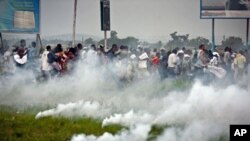Security forces in the Democratic Republic of Congo [DRC] killed at least 33 people during elections late last year, according to the United Nations.
The United Nations published a report Tuesday documenting a range of human rights violations during and following the DRC's presidential election in November, 2011.
It says at least 33 people were killed and 83 injured - mostly by gunshot - in the capital Kinshasa between November 26 and December 25. In addition, the U.N. says 16 people remain unaccounted for, and it accuses authorities of arbitrary arrests and torture.
The investigation was carried out by the U.N. Joint Human Rights Office.
The office's director in the DRC, Scott Campbell, spoke to VOA from Geneva.
“Most of the violence was targeting members of the political opposition or their supporters or in often cases, just people that were in the wrong place at the right time,” said Campbell.
The presidential and legislative elections were held on November 28. The vote returned Joseph Kabila to power, but the elections were criticized both within the DRC and by the international community, especially for lost ballots and vote tallies.
Campbell said the abuse was carried out by security and defense forces. There is no indication, he said, that they were carrying out specific orders or that a plan had been laid.
The government, he said, has seen the report and has made its own comments.
“They disagree with our numbers, they disagree with a number of our findings. But they do agree, and I think that this is perhaps most important, that there should be a thorough investigation by the government into what has taken place and this is one of our primary recommendations. So we're actually quite pleased with the level of engagement from the government on this report,” said Campbell.
He said provincial and local elections are set to take place in DRC later this year or next year and it’s important that the same level of abuse isn’t repeated.
It’s important, Campbell said, that a proper judicial review is made.
The international community, he said, also can help by training Congolese security forces.




